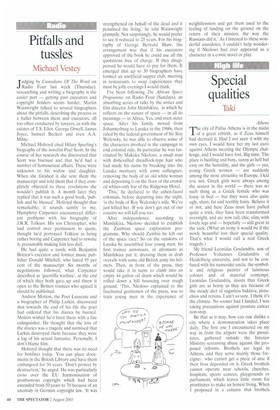Pitfalls and tussles
Michael Vestey
Judging by Custodians Of The Word on Radio Four last week (Thursday), researching and writing a biography is the easier part — getting past executors and copyright holders seems harder. Martin Wainwright talked to several biographers about the pitfalls, describing the process as a ballet between them and executors, all too often conducted by lawyers, as with the estates of T.S. Eliot, George Orwell, James Joyce, Samuel Beckett and even A.A. Milne.
Michael Holroyd cited Hilary Spurling's biography of the novelist Paul Scott. In the course of her research she discovered that Scott was bisexual and that he'd had a number of homosexual affairs. These were unknown to his widow and daughter. When she finished it she sent them the manuscript and told them that if they completely objected to these revelations she wouldn't publish it. A month later they replied that it was such a good book, 'publish and be blessed'. Holroyd thought that remarkable; it sounds saintly to me. Humphrey Carpenter encountered different problems with his biography of J.R.R. Tolkien. His son Christopher, who had control over permission to quote, thought he'd portrayed Tolkien as being rather boring and Carpenter had to rewrite it, presumably making him less dull.
He had quite a tussle with Benjamin Britten's executor and former music publisher Donald Mitchell, who hated 95 per cent of the manuscript. Six months of negotiations followed, what Carpenter described as 'guerrilla warfare', at the end of which they both gave up and threw it open to the Britten trustees who agreed it should be published.
Andrew Motion, the Poet Laureate and a biographer of Philip Larkin, discovered that towards the end of his life the poet had ordered that his diaries be burned. Motion wished he'd been there with a fire extinguisher. He thought that the loss of the diaries was a tragedy and surmised that Larkin destroyed them because they were a log of his sexual fantasies. Personally, I don't blame him.
Holroyd thought that there was no need for bonfires today. You can place documents in the British Library and have them embargoed for 50 years. 'Don't protect by destruction,' he urged. He was particularly cross over the EU harmonisation of posthumous copyright which had been extended from 50 years to 70 because of an anomaly in German copyright law. 'It was
strengthened on behalf of the dead and it penalised the living,' he told Wainwright grumpily. Not surprisingly, he would prefer to see it reduced to 25 years. For his biography of George Bernard Shaw, the arrangement was that if his executors approved of the book he could use all the quotations free of charge. If they disapproved he would have to pay for them. It emerged that up to 30 biographers have formed an unofficial supper club, meeting in restaurants to swap experiences; they must be jolly evenings I would think.
I've been following The African Space Programme on Radio Four (Sundays), an absorbing series of talks by the writer and film director John Matshikiza, in which he reflects on the nature of space — in all its meanings — in Africa. Yes, and even outer space. After his family moved from Johannesburg to Lusaka in the 1960s, then ruled by the federal government of Sir Roy Welensky, he was able to observe some of the characters involved in the campaign to end colonial rule. In particular he was fascinated by Mukaka Nkoloso, a small man with dishevelled dreadlock-type hair who had made his name by breaking into the Lusaka mortuary' with some colleagues, removing the body of an old white woman and depositing it on the floor of the crowded whites-only bar of the Ridgeway Hotel.
'This,' he declared to the ashen-faced colonials, before departing into the night, 'is the body of Roy Welensky's wife. We've just killed her. If you don't get out of our country we will kill you too.'
After independence, according to Matshikiza, Nkoloso decided to establish the Zambian space exploration programme. Why should Zambia be left out of the space race? So on the outskirts of Lusaka he assembled four young men, his first trainee astronauts, or afronauts as Matshikiza put it, dressing them in drab overalls with some old British army tin helmets. Then, in front of the press, they would take it in turns to climb into an empty 44 gallon oil drum which would be rolled down a hill bouncing over rough ground. 'This. Nkoloso explained to the fascinated gentlemen of the press, was to train young men in the experience of weightlessness and get them used to the feeling of landing on the ground on the return of their mission, the way the Russians did it.' As I listened to these wonderful anecdotes, I couldn't help wondering if Nkoloso had ever appeared as a character in a comic novel or play.


























































 Previous page
Previous page